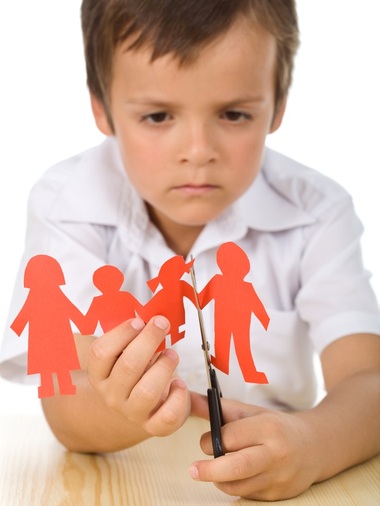Just A Part Time Kid – Divorce Part 1
[I wrote this article some time ago. Re-reading it now, it seems just a bit “preachy” to me, but still very true. Read it anyway. You can handle it – and it’ll be good for you!)]
I remember getting up to leave my examining room several years ago and seeing out of the corner of my eye a little nine-year-old trying to fight back tears.
The boy had just listened quietly for an extended period of time while his mother and I discussed their upcoming move to Florida, where her new husband had found a job. She explained the “part time” arrangements that she and “his father” had agreed to in their divorce.
Part of the discussion was about their divorce three years ago, how they were coping, the holidays and other time the kids spent at each of their houses and how it would change after the move. She had previously asked the nurse to pass me a message to see if there was anything I could write in a letter that would make the courts lean more favorably toward a new custody arrangement which largely excluded the natural father.
So, before leaving, I deliberately moved to stand between the tearful boy and his mother, blocking their view of each other, and lifted his chin in my hand quietly whispering “what’s the matter?”
Through sobs, he haltingly whispered back: “I’m just a part-time kid!” Now, becoming aware of the drama that had just happened, I had two crying people in my office.
I left to transfer a waiting patient to another doctor in order to make more time to talk with them. I was gone only a moment and when I returned, he was still sitting on the table crying and his mom, I guess not knowing what else to say, was now also sitting, on the other side of the room on her chair crying.
When he had settled somewhat, I asked, “What do you mean”? He replied, “I go part time here and part time there. Nobody likes me, and I’m just in the way”!
What neither of them knew was that I had spent a similar amount of time the day previous talking with the boys father, who had also asked me if I would write a letter to the court substantiating charges he was making to obtain permanent custody of the child!
 Here were two adults who were attached to the boy so much they were willing to do court battle; and yet with all of their show of attention to the child, he just “knew” that he was unloved.
Here were two adults who were attached to the boy so much they were willing to do court battle; and yet with all of their show of attention to the child, he just “knew” that he was unloved.
How can that be? Why was his perception so distorted? Or was it? You see, attention is NOT the same as affection.
There have been several studies where the effects of a divorce on the children have been rated by both parents and classroom teachers. Parents seem to “see” much less effect than does the child’s classroom teacher. Most of us “see” what it is “convenient” to see.
Children thrive on stability and routine in their environment. Moving, changes in parents’ employment, changing schools, illness or death in the family, and an absent parent all make them feel insecure and upset.
Any tear in the fabric of living increases anxiety which may be manifest by poor sleep, stomach aches, headaches, tiredness, nervousness, easy tears, clingyness, or withdrawal symptoms.
Symptoms of this anxiety and stress are nearly always present if one is sensitive enough to look for it.
It is not easy for children to switch surroundings and loyalties a the drop of a judge’s gavel.
It seems almost superficial to say, but every child is fifty percent the other parent; and most children sense it, especially older children.
If a parent attacks or maligns the absent parent, part of the child is attacked whether they voice their displeasure or not.
So if half of him is attacked when he is with his father and the other half is attacked when he is with his mother, then one hundred percent of him is “no good.”
When environmental stresses outweigh the ability of the child to cope, symptoms of anxiety often appear; such as, thumb sucking, hair pulling, tics, nightmares, fears, stuttering, bed wetting, soiling, acting out and depression.
Depressed children may appear to be “wizened” beyond their years – older than they are – having a serious approach to their daily lives and finding little pleasure in the recreational activities common to their age group.
Or, they may regress to an earlier stage of childhood development; or, act as though driven by a motor to activity – either in an effort to keep the stressful thoughts out of their mind or just to act on the stress they feel.
They may be described as sensitive, with tender emotions and may have a tendency to cry easily or are easily angered. They may be self-depreciatory and easily frustrated.
Parents, however, can make it easier for the kids – and themselves – by being aware of the problems associated with divorce, their symptoms, and having an ability and a willingness to help the children cope with their struggles.
Next week I will share with you several parenting “rules” for minimizing the stress that a child goes through during divorce.
2 Posts in Divorce for Children (divorce) Series
- Part 2 - Part Time Kid – 17 Dec 2011
- Part 1 - Part Time Kid – 17 Dec 2011
Advertisement by Google
(sorry, only few pages have ads)

